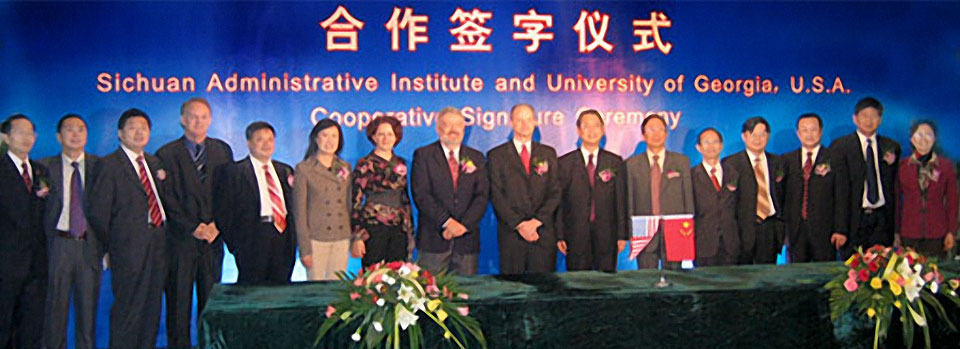Public policy, human resource development, regionalism, and program evaluation are no longer foreign concepts to a growing number of Chinese local officials. Since 1999, more than 500 of them have been learning about current public administration practices through the Sino-American Joint Training Program coordinated by the Carl Vinson Institute of Government’s International Center for Democratic Governance (ICDG).
Most Chinese provinces have an administrative college or institute charged with training municipal and provincial officials, explains Jennifer Frum, interim ICDG director. “What started with a partnership with Shanghai Administrative Institute has spread to similar entities in the cities of Beijing and Tianjin and in the provinces of Sichuan, Jiangxi, and Qinghai.”
“The China program is really about applying the expertise of Vinson Institute and UGA academic faculty to that country’s governance challenges at the municipal and provincial levels,” said Steve Wrigley, Vinson Institute director. “These are capacity-building efforts that contribute directly to more efficient local government public management across China and the development of officials who are more responsive and accountable to citizens.”
The two-part instructional program begins in China with short courses taught by Vinson Institute and UGA faculty and Georgia state and local government practitioners, according to Peter Gess, ICDG faculty member who has coordinated many of the exchanges. “These courses include core public management topics, as well as specialized ones on request,” he says.
UGA faculty members and guest instructors Richard Rohs and Kristina Jaskyte agree that the Chinese managers are eager to learn about public administration tools that they can utilize. “They find the program evaluation examples and hands-on projects valuable in helping them understand their current procedures,” Rohs notes. “While some of the ideas might not be easily transferable to the Chinese system, after two weeks of lecturing I came home feeling like I contributed my knowledge to the students’ overall professional development,” says Jaskyte.
The second phase of the program enables the Chinese officials to spend time with their counterparts in Georgia local communities, as well as in Atlanta and Washington, D.C. Vernon Martin, executive director of the Coastal Georgia Regional Development Center in Brunswick, believes that the participant-officials find value in witnessing regionalism in action as they confront significant issues related to economic growth and expansion.
“I think that the cross-cultural phase is beneficial to both the Chinese delegates and to our staff,” remarks Phil Sutton, Hall County administrator. “There may be differences in our governments, but there are similarities in the daily issues we confront. Meeting face to face allows us to better appreciate and respect each other.”
